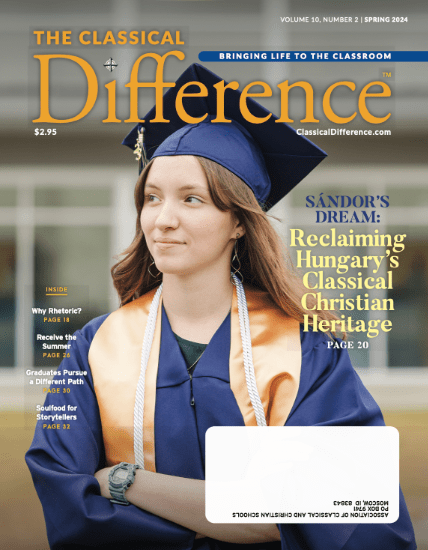Spring 2018
The Great Teacher modeled a perfect balance between mercy and law— we call this grace.
In classical Christian schools, our wisdom as teachers is often tested as we attempt to hold students to a standard, while understanding that each student has unique challenges.
The privilege and burden of our call to be “Christ” in this world is rarely felt so much as by a classroom teacher. Jesus modeled great teaching in every encounter he had with his disciples. He walked around doing two things: connecting with students (disciples) in their weakness and demanding that they do the difficult—leave their job, their family, their home. He extended mercy but expected greatness. This is what great teachers do.
When it comes to learning disabilities, two realities collide. Every student is different, but some students are “outliers.” Outliers take attention. And, the classroom format puts teachers in a difficult position—how to serve many students in this environment. Nearly every teacher can name three or four of their 20 students who take the majority of their mental energy. Often, parents expect too much.
On the other hand, schools sometimes forget that they are not running a factory, but rather a place of discipleship. “We can’t let Johnny pass sixth grade when he can’t spell and has terrible handwriting.” Why not? “Because it wouldn’t be fair.” Fair? Was it fair for the apostle John to be declared the disciple whom Jesus loved? When schools lose sight of why they exist—to cultivate every child to rightly order their affections and to love Truth, Goodness, and Beauty—they fail in their classical Christian mission.
But, parents who seek mercy for their child sometimes want teachers or schools to carry the burden. We cannot imagine Jesus telling a disciple, “If this job I gave you is too hard or an imposition, just do what you can and let someone else pick up the slack.” Peter might have gone on fishing and Matthew tax collecting, and the rich young ruler might have been relieved. Ephesians 6 gives parents the responsibility for the education of their children. Teachers are hired help. So, in all this, classical Christian schools need to find the right formula for learning disabilities. On one hand, we are free to meet students where they are and not be too stuck on our processes. On the other hand, we cannot ask teachers to fix the problems. They have many other students to serve. But we can ask them to be flexible.
Many “disabled” students have been helped by the higher expectations and structured environment in a classical Christian school. But a student with autism or dyslexia may need some adjustment to succeed. In this issue, we’ll tackle some of the tough decisions parents make, and some of the myths that persist about learning disabilities. ![]()











